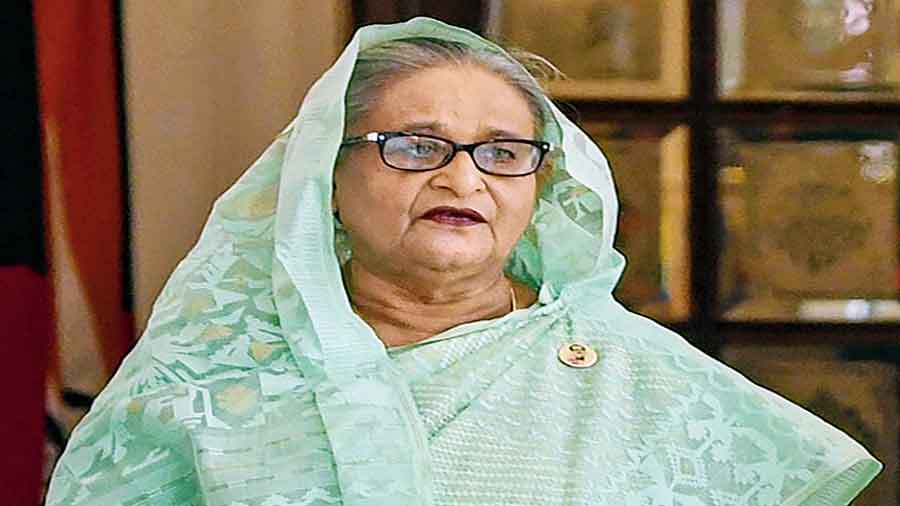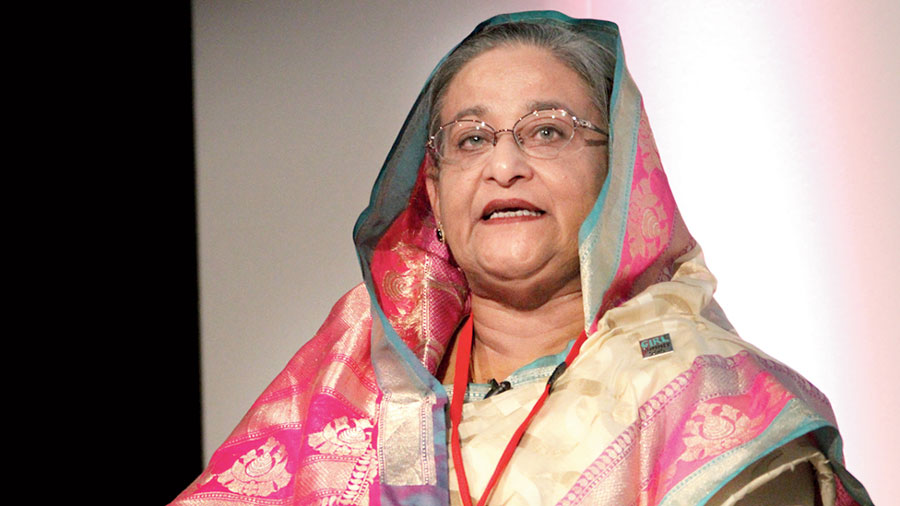Bangladesh Prime Minister Sheikh Hasina will have reason to smile while flying back home from India on Thursday.
The Prime Minister will be taking back with her an offer to use a select set of Indian seaports, land ports and airports for free transit of Dhaka’s exports to third countries and a pledge to consider the steady flow of essential commodities and to ensure fuel supplies from India.
The other takeaways include a broad understanding to bring down the deaths along the borders, an agreement to connect the two countries’ power grids and an Indian assurance to support Dhaka for the expeditious and safe return of the forcibly displaced Rohingyas to their homeland.
That Hasina was content with the outcome of her Delhi visit was clear on Wednesday.
“Having forged a strong partnership over the last 50 years, both countries are working on an increasingly wide range of sectoral collaboration,” she said.
“The relationship is known to be the role model for neighbourhood diplomacy worldwide,” Hasina added in her speech at a programme where direct descendants of the Indian soldiers and officers martyred or critically wounded during the Liberation War of 1971 were awarded the Mujib Scholarship.
On Thursday, after visiting the Ajmer Sharif in Rajasthan, Hasina will fly to Dhaka, where she will face a barrage of questions.
The success of bilateral visits by heads of state is normally measured in terms of takeaways for both countries, but the yardstick has often been different in Dhaka whenever Prime Ministers of India and Bangladesh have visited each other’s capitals.
“What has Bangladesh got from the trip?” has been the predominant question in the neighbouring country’s capital after all such visits.
Public scrutiny of the takeaways for Bangladesh has been more intense whenever Hasina -- often criticised in her country as pro-India -- has been involved in the bilateral visits.
“The glass is now more than half full.… I think the outcome of the visit is very positive,” said Shamsher Mobin Chowdhury, former foreign secretary of Bangladesh, referring to the joint statement issued by both countries on the penultimate day of Hasina’s visit to India after a gap of almost three years.
While the Opposition parties in Bangladesh have already begun accusing Hasina of “returning empty-handed”, a closer reading of the joint statement --- prepared after officials of both sides burnt the midnight oil to reach a consensus -- reveals the incorporation of some of the most important concerns of Bangladesh.
Several policy experts in Bangladesh, such as Chowdhury, believe that the free transit for Bangladeshi exports to third countries, though not unrestricted, is one of the major gains from the visit and would benefit the Bangladesh economy.
When Bangladesh had earlier offered India transit through its territory, the Opposition parties had accused Hasina of kowtowing to India without securing anything in return. “This time, she clearly has something to show,” said Chowdhury, congratulating Hasina for the progress made in areas of connectivity that would give a big push to regional trade.
A senior editor with a Bangladeshi news network said the cooperation in power generation and transmission -- both in the public and private sectors -- was the “best news” for the country as dwindling foreign reserves had prompted the government to shut down diesel-fired power stations.
“We are back to the days of long power cuts.… We hope the Adani group’s power supply assurance will change the situation,” the senior journalist said.
As Hasina faces the general election next year seeking a fourth term in a row, the ruling Awami League is trying to address the power outages that have turned the mood against the government.
The knives have always been out for her after every bilateral visit since 2011, with the much-awaited Teesta water-sharing agreement yet to be completed. Though there was no likelihood this time, either, of any progress on the Teesta deal – stuck because of opposition from Bengal chief minister Mamata Banerjee -- detractors have already begun attacking Hasina.
The fact, however, is that Hasina did mention the need for a speedy resolution of the Teesta stalemate, and the Bangladeshi side also got it recorded in the joint statement. Besides, the two sides not only signed an MoU on sharing the Kushiyara river’s waters, they also made significant progress in the discussions on managing water resources.
“Whenever Prime Ministers of India and Bangladesh meet, it generates a lot of expectations.… The Opposition parties in our country can’t do anything other than attacking the Prime Minister,” said Shammi Ahmed, international affairs secretary, Awami League.
The Indian side tried to address some of the Bangladeshis’ pet peeves, with the joint statement incorporating an assurance to look into the demand for a predictable supply of essential items such as rice, wheat, sugar, onion, ginger and garlic.
In the past, India had often restricted exports of some of these items when faced with supply shocks itself. These decisions had stoked anti-India feelings in Bangladesh. The issue of a steady supply of fuel has also found mention in the joint statement.
Border killings --- another contentious issue in the neighbouring country -- has also made it to the joint statement, with both sides appreciating the fall in the number of deaths along the border.
“Recently, the DG of the BSF was in Bangladesh for the BSF-BGB (Border Guard Bangladesh) conference.… It is true that the number of deaths along the border has come down. We have made a lot of progress in our relationship and the joint statement reflects that,” said Biplab Barua, office secretary of the Awami League.
In keeping with a demand from Hasina’s team, the joint statement has also included the issue of Rohingya repatriation to Myanmar, for which Dhaka is seeking India’s support.
A source on the Indian side said that while New Delhi can do little about the repatriation of Rohingyas, it recognises the humanitarian approach of the Hasina government in giving shelter to over a million people from the Rakhine province in Myanmar.
“...Will support both Bangladesh and Myanmar, as the only country that is a neighbour of both, in the effort to ensure safe, sustainable, and expeditious return of these forcibly displaced people to their homeland,” read the joint statement.











